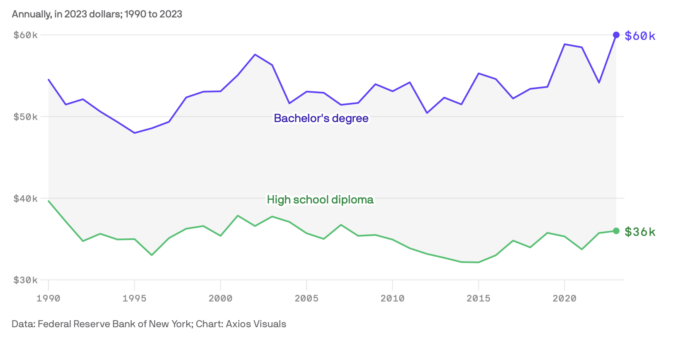Yes, college is still worth it: The wage gap between recent college and high school grads has been widening for decades, and grew even more last year, per new Federal Reserve data.
Why it matters: Even so, Americans are falling out of love with the idea of a four-year degree.
- Confidence in the value of a college education, a cornerstone of the American dream, is falling, per polling from Gallup and the Wall Street Journal.
Reality check: Economic data show clearly that a college degree gives individuals a lifetime earnings edge — and other benefits. Despite what you’ve heard about AI stealing our jobs, the U.S. economy needs educated workers to grow and flourish: how else would that AI get developed?
Zoom in: In 2023, recent college grads age 22-27 working full-time earned $24,000 more per year than 22-27 year olds with only a high school degree.
- Back in 1990 the gap was $15,000, according to the numbers tracked by the NYFed.
- To put that in perspective, by their early 20s the high-school degree workers likely have many more years of work experience than the new college grads — yet they’re still getting out-earned.
Yes but: That gap is just the beginning. The wage premium goes on to double over a worker’s lifetime, according to research economist David Deming published last year.
- He was able to follow a group of college-educated workers through their working lives. At age 25 these folks had a 27% premium over high school only graduates. By age 55, that premium was 60%.
- “It’s malpractice to tell a young person that a college degree isn’t necessary anymore,” says, Deming, who is a professor at the Harvard Kennedy School.
Follow the money: A lot of research, surveys and news articles evaluate the worth of a degree for recent graduates — but the value of college education accrues over a workers’ lifetime.
- Even those who don’t graduate have higher earnings than those who don’t go at all.
For example: A trucker might earn around $50,000, about what a newly minted college grad might make, Deming points out in a piece for The Atlantic.
- Knowing that, you might question spending a lot of money on a degree, if you can make the same money without one.
- Thing is: Jobs that high-school graduates typically get don’t see much wage growth. Truck drivers, with years and years of experience, don’t go on to make considerably more money — than newbies.
- Someone in, say, marketing or HR or even journalism, might see their salary double or more over their lifetime.
More educated workers are also more likely to have other benefits — the ability to work remotely, access to paid sick and family leave, health insurance.
The intrigue: In 2022 the college premium narrowed as real wage increases for lower income earners soared on the back of big post-pandemic demand for workers in sectors, like restaurants, facing worker shortages.
- That was a blip — the gap has since widened again.
“We’re in an economy that puts a premium on high skill, knowledge, idea generation,” says Jaison Abel, head of urban and regional studies at the NY Fed who’s tracked this data for years.
- “There’s fewer and fewer opportunities, especially good paying opportunities, for those who have just a high-school diploma.”
